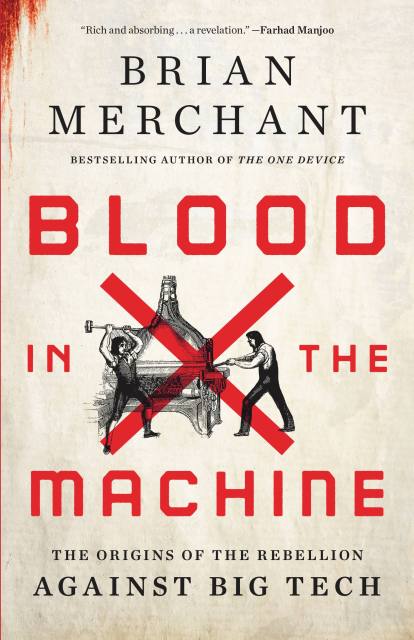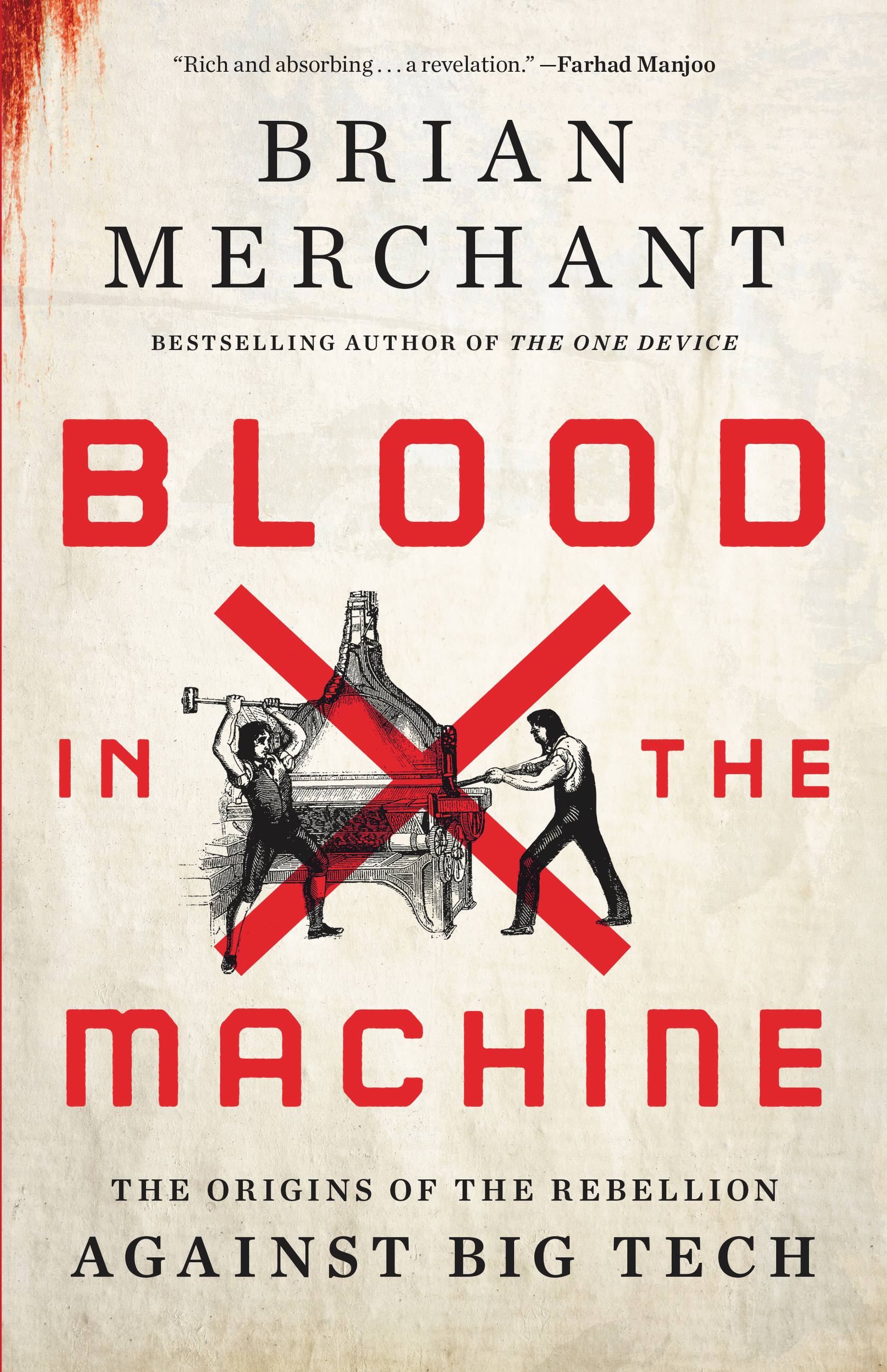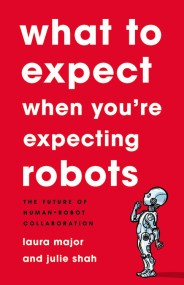Promotion
Use code MOM24 for 20% off site wide + free shipping over $45
Blood in the Machine
The Origins of the Rebellion Against Big Tech
Contributors
Formats and Prices
Price
$30.00Price
$38.00 CADFormat
Format:
- Hardcover $30.00 $38.00 CAD
- ebook $14.99 $19.99 CAD
- Audiobook Download (Unabridged) $31.99
This item is a preorder. Your payment method will be charged immediately, and the product is expected to ship on or around September 26, 2023. This date is subject to change due to shipping delays beyond our control.
Also available from:
"The most important book to read about the AI boom" (Wired): The "gripping" (New Yorker) true story of the first time machines came for human jobs—and how the Luddite uprising explains the power, threat, and toll of big tech and AI today
Named one of the best books of the year by The New Yorker, Wired, and the Financial Times • A Next Big Idea Book Club "Must-Read"
The Luddites organized guerrilla raids to smash those machines—on punishment of death—and won the support of Lord Byron, enraged the Prince Regent, and inspired the birth of science fiction. This all-but-forgotten class struggle brought nineteenth-century England to its knees.
Today, technology imperils millions of jobs, robots are crowding factory floors, and artificial intelligence will soon pervade every aspect of our economy. How will this change the way we live? And what can we do about it?
The answers lie in Blood in the Machine. Brian Merchant intertwines a lucid examination of our current age with the story of the Luddites, showing how automation changed our world—and is shaping our future.
Genre:
-
“I’ve thrown around the word ‘Luddite’ often in my work, mainly as a cheap insult, so Brian Merchant’s rich and absorbing history of the movement was, for me, both a revelation and an embarrassment. The embarrassment is at how little I’d known about them, and how the lessons I’d taken from their effort were based on a silly caricature. The revelation, in Brian’s deft telling, is that technology never has to be inevitable, that we humans have agency over how we live with the machines, and that perhaps the best way to figure out what to do about the future is to look to the past.”Farhad Manjoo, New York Times Opinion columnist
-
“A rich and gripping account of a chronically misunderstood historical chapter, one with urgent relevance to our own time, as we once again pit humans against machines.”Naomi Klein, New York Times Bestselling author of This Changes Everything
-
"A thrilling history and a stirring manifesto for seizing the means of production, or smashing it, when necessary. Automation has always been about turning people into machines: brainless and disposable. To be a Luddite is to demand a say in the future. It's not enough to ask what a machine does - we have to ask who it does it for and who it does it to."Cory Doctorow, New York Times bestselling author of Little Brother and The Internet Con
-
“This is an absolutely indispensable, shocking, and fascinating tale by one of today’s most important technology writers. This riveting book is as much a work of history as it is an urgent examination of our ability to resist the overwhelming changes technology is wreaking on our lives. The Luddites knew that automation, job loss and the consolidation of wealth aren’t inevitable. We can shape these forces if we’re willing to break a loom or two.”Christopher Leonard, New York Times bestselling author of Kochland and The Lords of Easy Money
-
“Forget everything you know about the Luddites. After Blood in the Machine you’ll never look at your computer screen – or a hammer – the same way again.”Malcolm Harris, bestselling author of Palo Alto
-
"An immersive, propulsive tale...an eye-opening history delivering powerful lessons for our high-tech present."Margaret O'Mara, author of The Code: Silicon Valley and the Remaking of America
-
“Brian Merchant has pulled off a kind of temporal magic trick: He's told a two-century-old story with such resonant themes about technology, labor and human exploitation—and done it with such gripping, visceral detail and empathy—that it feels like it's about our future.”Andy Greenberg, author of Sandworm and Tracers in the Dark
-
“A riveting look into the past, and a cautionary tale for our rapidly approaching future…. Fast paced, engagingly written, and exhaustively researched, this work of history could not feel more relevant to the current moment. It’s one of the best books I’ve ever read.”Kim Kelly, author of Fight Like Hell: The Untold Story of American Labor
-
"Engrossing and exhaustively researched"The Culture Journalist
-
"A well-argued linkage of early industrial and postindustrial struggles for workers' rights."Kirkus
-
"Brian Merchant’s new book...is phenomenal. It is both a rousing, meticulously-researched history and an insightful, timely argument about the present state of technology. It’s one of those books that sticks with you...You should buy it. You should read it.""The Future, Now and Then" Newsletter
-
“Stirring...This is a significant contribution to the history of the Industrial Revolution and a strong warning against complacency in the face of technological change.”Publishers Weekly
-
“This book is a welcome parable of worker solidarity and resistance.”Booklist
-
“Blood in the Machine compares the labor struggles of the Industrial Revolution to today’s abusive gig economy.... Derived from an immense trove of archival materials and secondary historical sources, [Merchant] brings a journalist's touch to the Luddites' travails, drawing connections between the conflicts and indignities of their epoch and our own.”Gavin Mueller, New York Times Book Review
-
"Merchant's retelling of the Luddite cause is a gripping and detailed romp."Wired
-
"An eye-opening read... Merchant unspools a myth-busting historical tale interwoven with pointed comparisons to how modern tech giants are eroding workers’ collective rights."New Scientist
-
“An excellent book that everyone should read.”DailyKos
-
“A historical tour de force.”CyberNews
- On Sale
- Sep 26, 2023
- Page Count
- 496 pages
- Publisher
- Little, Brown and Company
- ISBN-13
- 9780316487740
Newsletter Signup
By clicking ‘Sign Up,’ I acknowledge that I have read and agree to Hachette Book Group’s Privacy Policy and Terms of Use







